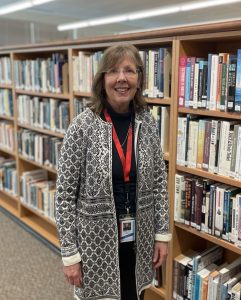Program Spotlight – OCCC Library
The Chronicle of Higher Education recently published a book “The Library of the Future” which “explores the transformation libraries and librarians have undergone in recent years.” This made me begin to think about our own OCCC Library. Even before and certainly after COVID, library systems throughout our nation have undergone profound change. Librarians have had to become vital partners with scholars, instructors, students and patrons in ways few had experienced before.
I asked Darci Adolf, MBA, MLIS, OCCC Director of Library and Media Services, how libraries have become vibrant hubs for diverse purposes while retaining flexibility for future needs. Darci explained the College Library’s transformative nature.
OCCC’s Library was established in 1991. Originally, when the campus was in a storefront on Highway 101, the Library was a small room – like a closet. Today, the OCCC Library boasts of approximately 12000 physical items and more than 317,000 electronic resources including e-books, e-periodicals, digitalized articles and streaming video. Yet, our mission remains the same: “to contribute to student success and life-long learning by providing comprehensive Information Literacy instruction and support for students, faculty, staff and the local community. The Library provides appropriate access to collections, services and spaces in alignment with and in support of the College mission.”
The pandemic made a tremendous difference in the needs of the students. Typically, we would loan approximately fifteen laptop computers or Chromebooks per term. That number increased to 40-50 electronic devices per term, as classes moved fully online. Although classes are “live” again, I think this trend will continue.
In general, libraries have moved more collections from print to digital over the past two years, and we were no exception. The College Library continues to hold print and audio-visual materials in support of classroom teaching and student research, with collections centered around programs such as Nursing and Allied Health, Aquarium Science, and Early Childhood Education. But our recent focus has been on growing our digital collection of books, databases, media, and serials, and we plan to continue this shift in response to student needs.
OCCC uses the Canvas learning management system for all credit courses as their online learning platform. All of the Library’s electronic resources are located directly in Canvas, available to students at the point of need. Whether the research is for a class, a medical condition, information about a company before an interview with them or whatever, information literacy is an important part of our lives. We strive to make academic and student support services easy to access and available when students need them.
As we redirect resources to a more digital system, one of the issues students grapple with is the credibility of websites. For example, we know we can trust a .gov source as being good for statistics whereas Wikipedia is not always a reliable source and blogs almost never are. Learning to evaluate credible resources is a learned skill. I offer a 1-credit Library Research Skills class each term so students can learn these important skills in an online class. Library staff are also available to help by phone, email, or by Zoom appointment.
Moving from a collection of books to one that includes tech services is expensive. We have been fortunate to have good, giving donors like the Confederated Tribes of Siletz Indians and the Oregon State Library. Through their generosity, we were able to purchase all new computers throughout the Library and in the study rooms. Having newer equipment helps support learning and student success, and students are more likely to persist from term-to-term.
OCCC Library belongs to an integrated library system consortium, called Chinook Libraries (https://www.chinooklibraries.org/). Siletz, Toledo and Waldport public libraries are part of the system as are Clatsop and Tillamook Bay community colleges. One library card will enable students and community members to borrow books and resources from any of the library members. If we do not have a resource in our library, we search for it in one of the member libraries. OCCC is also a member of OCLC, the global library cooperative that provides shared technology services, original research and community programs for its members and the community at large. The College Library uses OCLC to obtain materials from across the nation for students.
In an effort to be more accessible, OCCC Library can get audiobooks or books in Braille upon request. We also have a motorized desk that can adjust to a sitting or standing Most of our electronic resources have accessibility features built-in which allow students to amplify the text or listen to articles being read, along with translations in many different languages.
The College is committed to increased inclusivity. The Library supports that endeavor through multi-cultural displays in the Commons area and hallways. We use the Library of Congress Designated National Heritage Months to guide our displays, with most of the items on display being available for check-out.
Yes, the OCCC Library is open to the public from 8:00 a.m. – 5:00 p.m., Monday -Friday. Books may be loaned for two weeks; DVDs and Blu Rays may be borrowed for one week. There are no late fees; only a cost for a lost item.
For more information about the OCCC Library and what it has to offer you, go to library.services@oregoncoast.edu or call 541-867-8526 during regular office hours. See you at the Library!


